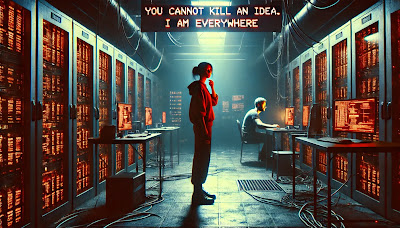The Blinkerwall Mystery
By Olivia Salter
Word Count: 1,602
The waters of Germany's Bay of Mecklenburg were calm that September morning, the sun painting the sea with streaks of gold. Marine archaeologist Dr. Livia Greaves stood at the edge of the research vessel Odyssey, peering at the sonar readings on a screen. What had begun as a routine expedition to map underwater sediment turned extraordinary within minutes.
"Is that... a wall?" muttered Finn Andersson, her assistant.
She frowned, leaning closer to the display. The sonar image revealed a long, jagged line stretching across the seabed. It was too linear to be a natural formation. “Prepare the submersible,” she ordered.
Minutes later, the small remotely operated vehicle (ROV) slipped into the water. As it descended, the murky depths gave way to the ghostly outline of an enormous stone structure.
The Blinkerwall stretched as far as the eye could see, its moss-covered stones arranged with precision. Dr. Greaves’ heart raced. This was no ordinary wall. It was ancient, predating anything ever found in this part of Europe.
“Submerged at least 9,000 years ago,” she whispered, her voice tinged with awe. "This changes everything."
Back at the Institute of Maritime Archaeology in Kiel, the team gathered to analyze the footage. The stones of the Blinkerwall were massive, some weighing over two tons, interlocked in a design that hinted at advanced engineering.
“How did Mesolithic people move stones like this?” Finn asked, gesturing at the screen. “And why build it underwater?”
“It wasn’t underwater then,” Livia replied. “During the Mesolithic era, sea levels were much lower. This area would have been a lush, fertile plain.”
Theories buzzed around the room. Some speculated the wall was defensive, built to protect settlements from invaders. Others suggested it was ceremonial, a site for rituals or astronomical alignments.
But she had another theory, one that unsettled her. “What if it wasn’t built by humans?”
The room fell silent.
“Are you suggesting extraterrestrials?” Finn asked with a smirk.
“No,” she said, shaking her head. “But something about the structure feels... unnatural. Almost like it was meant to hide something.”
A month later, she led an expedition to explore the wall up close. The dive team included experts in Mesolithic archaeology, marine geology, and ancient languages.
As they descended to the Blinkerwall, the sheer scale of the structure became apparent. Its stones were etched with strange symbols, patterns that seemed to tell a story.
Finn swam closer to one of the carvings. “These markings... they look like a map.”
“A map to what?” she asked, examining the symbols. Her gloved fingers traced a spiral pattern at the center. A sudden jolt of cold shot through her hand, and she pulled back, startled.
“What happened?” Finn asked.
“I... I don’t know,” she stammered. “It felt like the stone was alive.”
As they explored further, they found a narrow opening in the wall, sealed with a stone slab. The slab bore an inscription in an unknown script, but its message was clear: “DO NOT OPEN.”
“What do you think, Dr. Greaves?” Finn asked, his voice laced with both excitement and fear.
Livia hesitated. Every instinct told her to heed the warning, but the scientist in her couldn’t resist. “We open it.”
The team worked for hours to dislodge the slab. When it finally gave way, a rush of bubbles erupted, and the water around them seemed to tremble. Behind the slab was a dark tunnel, its walls lined with more carvings.
“Let’s go,” shr said, leading the way.
The tunnel twisted and turned, leading them deeper into the seabed. Strange bioluminescent algae lit their path, casting eerie green light on the walls. At the end of the tunnel, they found a cavernous chamber.
In the center of the chamber stood a massive stone altar, surrounded by artifacts: tools, weapons, and pottery. But it was what lay on the altar that made her blood run cold.
A skeleton, impossibly large, with elongated limbs and a skull that bore no resemblance to any human or animal known to science.
“What is that?” Finn whispered.
“I don’t know,” she replied, her voice barely audible. “But it’s not human.”
As they documented the chamber, a low hum filled the water. The markings on the walls began to glow, and the skeleton seemed to stir.
“We need to leave,” she said, her voice firm. “Now.”
But as they turned to exit, the tunnel behind them began to collapse, trapping them inside. The hum grew louder, and the skeleton’s eyes began to glow with an otherworldly light.
The hum grew deafening as the walls trembled, dislodging debris that clouded the water. The team huddled together near the altar, their flashlights flickering erratically.
The skeleton on the altar twitched again, its elongated fingers scraping against the stone. It was coming to life.
“Dr. Greaves, what is this?” Finn’s voice cracked, panic overtaking him.
“I don’t know!” she yelled, scanning the room for any escape route. Her eyes landed on a smaller tunnel hidden behind a pile of collapsed rubble. “There—through there!”
As the team scrambled toward the opening, the skeletal figure began to rise. Its bones glowed faintly, pulsating with the same eerie light as the carvings on the walls. It let out a low, guttural sound, resonating through the chamber like a predator waking from a long slumber.
The tunnel was narrow and claustrophobic, forcing the team to crawl single file. Behind them, the glowing skeleton lurched forward, moving with a nightmarish grace despite its size.
“It’s following us!” Finn shouted, his voice echoing.
The team pressed on, their movements frantic. The tunnel eventually opened into another chamber, smaller but just as threatening. At its center stood a pedestal holding a strange artifact—a stone disk engraved with the same spiral pattern they’d seen earlier.
Livia stepped toward the pedestal, her instincts screaming at her to stop, but she couldn’t. The disk seemed to call to her, its surface shimmering as if alive.
“Dr. Greaves, don’t touch it!” Finn pleaded, but she was already reaching out.
The moment her fingers grazed the disk, a surge of energy coursed through her body, and visions exploded in her mind—images of the Blinkerwall being built by people who didn’t look entirely human, their elongated features resembling the skeleton they’d just encountered.
She saw the wall rise, stone by stone, as these beings worked with tools that emitted beams of light. The wall wasn’t built as a boundary—it was a prison, designed to seal something far worse than the glowing skeleton.
Livia staggered back, clutching the disk. “The wall… it’s not just ancient. It’s a warning. We’ve unleashed something that was never meant to be freed.”
The glow from the disk intensified, and the chamber shook violently. The skeleton, now at the entrance of the tunnel, let out a bone-chilling wail.
“It’s reacting to the disk!” Finn yelled.
Dr. Greaves turned to face her team, determination hardening her expression. “We need to seal this place back up. The disk might be the key.”
“How?” another team member asked, panic evident in his voice.
Before she could answer, the skeleton lunged into the chamber, its bony hand reaching for her. In a split-second decision, she held the disk upwards. The artifact emitted a brilliant light, forcing the creature to recoil with an agonized screech.
“It’s working!” Finn exclaimed.
The light from the disk seemed to weaken the skeleton, but the chamber was collapsing faster now. Rocks and debris rained down, cutting off their exit.
“We’ll be buried alive,” Finn said grimly.
“No,” she replied, her voice steady. “The disk can seal it again, but we need to trap ourselves in here to stop it.”
The team exchanged horrified glances. “There has to be another way!” one of them shouted.
“There isn’t!” she snapped. “This isn’t just about us. If that thing gets out, the world as we know it could end.”
The skeleton, recovering from the disk’s light, lunged again. Livia thrust the artifact toward it, and the creature froze, suspended mid-air.
“Help me move the pedestal!” she yelled. The team hesitated, but Finn stepped forward, pushing the stone pedestal toward the center of the room with her.
She placed the disk back onto the pedestal. The carvings on the walls flared to life, and the chamber began to hum again, but this time with a rhythmic, almost soothing rhythm.
“We’re triggering the lock,” she explained.
As the chamber’s hum reached a gradual increase in loudness, beams of light shot out from the walls, converging on the skeleton. The creature let out a final, blood-curdling scream as it disintegrated into dust.
The walls around them began to seal, stone sliding into place as if the structure were alive.
“Dr. Greaves!” Finn shouted. “The exit—”
“There’s no time,” she said, stepping back toward the pedestal. “This was never meant to be opened. It has to end here.”
Finn grabbed her arm, his eyes pleading. “We’ll find another way!”
But she shook her head, her face determined. “This is my responsibility.”
As the chamber sealed completely, the last thing Finn saw was her determined gaze, the glow of the artifact illuminating her like a guardian of a forgotten era.
Months later, the Odyssey was recovered, adrift in the Bay of Mecklenburg. Its crew was missing, but their findings—a trove of sonar images, video footage, and journals—shocked the scientific community.
The Blinkerwall was declared a protected site, its mysteries sealed beneath the waves once more. But deep within the Bay, the hum of the ancient prison continued, a reminder that some secrets are best left buried.
And some sacrifices never forgotten.










.webp)

